Legal System for Business Law - BSc (Hons) Business Management - BMP4002 Business Law Assessment 1
VerifiedAdded on 2023/06/13
|8
|2789
|167
AI Summary
This report covers the legal system for business law in the UK, including classifications of law, sources of law, and the UK law making process for employment law. It also discusses the duties of employers and wrongful and unfair dismissal actions.
Contribute Materials
Your contribution can guide someone’s learning journey. Share your
documents today.
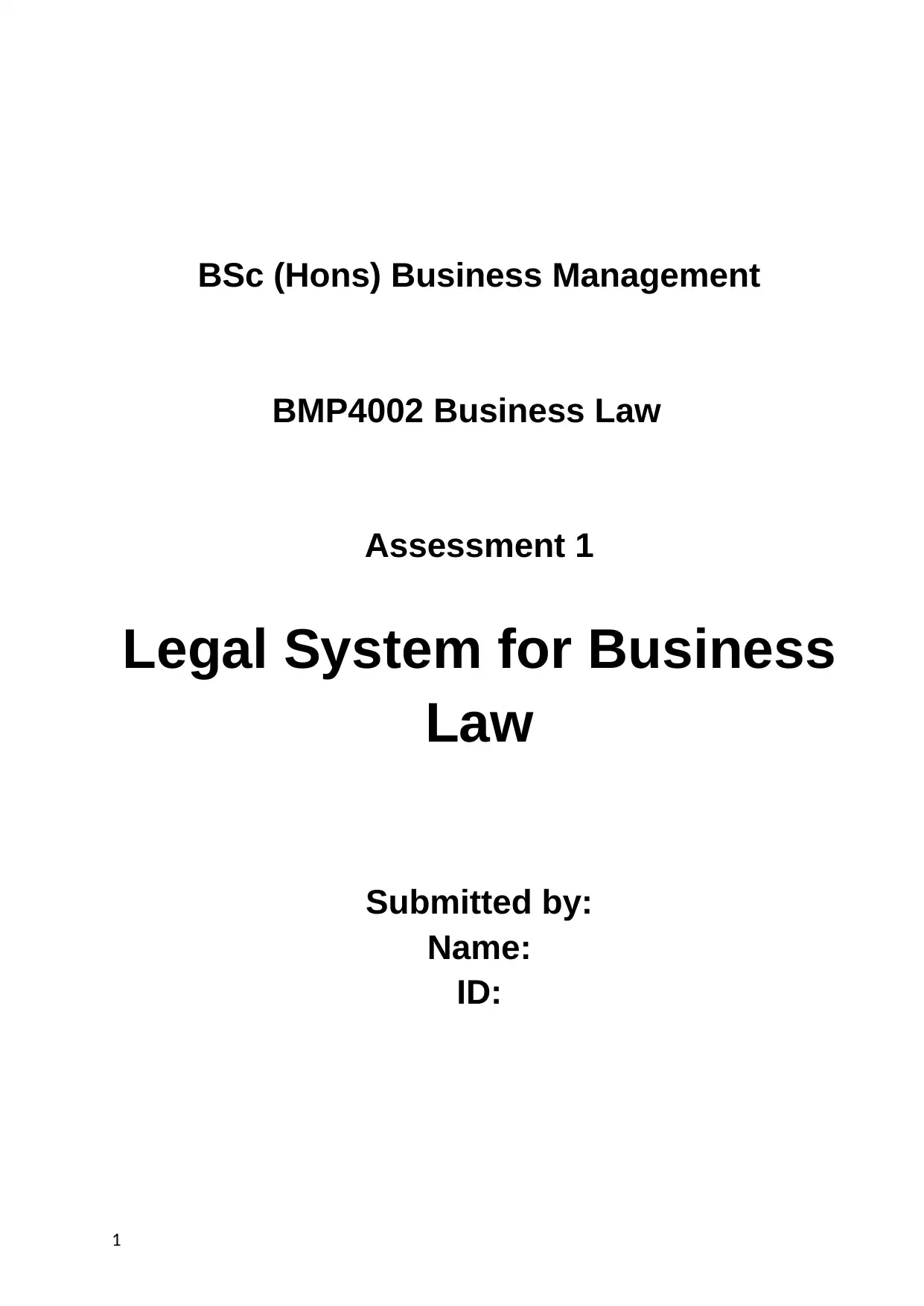
BSc (Hons) Business Management
BMP4002 Business Law
Assessment 1
Legal System for Business
Law
Submitted by:
Name:
ID:
1
BMP4002 Business Law
Assessment 1
Legal System for Business
Law
Submitted by:
Name:
ID:
1
Secure Best Marks with AI Grader
Need help grading? Try our AI Grader for instant feedback on your assignments.
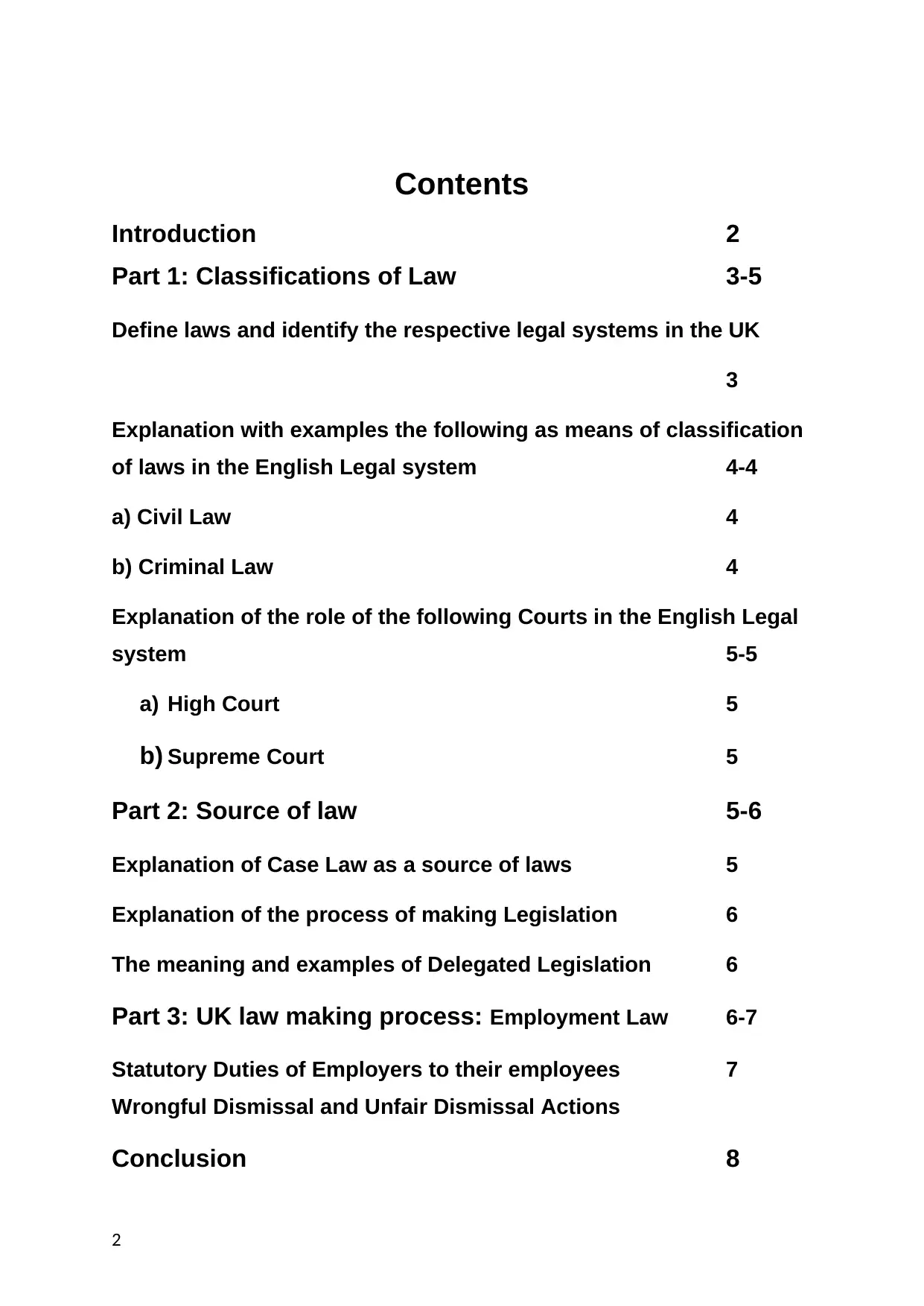
Contents
Introduction 2
Part 1: Classifications of Law 3-5
Define laws and identify the respective legal systems in the UK
3
Explanation with examples the following as means of classification
of laws in the English Legal system 4-4
a) Civil Law 4
b) Criminal Law 4
Explanation of the role of the following Courts in the English Legal
system 5-5
a) High Court 5
b) Supreme Court 5
Part 2: Source of law 5-6
Explanation of Case Law as a source of laws 5
Explanation of the process of making Legislation 6
The meaning and examples of Delegated Legislation 6
Part 3: UK law making process: Employment Law 6-7
Statutory Duties of Employers to their employees 7
Wrongful Dismissal and Unfair Dismissal Actions
Conclusion 8
2
Introduction 2
Part 1: Classifications of Law 3-5
Define laws and identify the respective legal systems in the UK
3
Explanation with examples the following as means of classification
of laws in the English Legal system 4-4
a) Civil Law 4
b) Criminal Law 4
Explanation of the role of the following Courts in the English Legal
system 5-5
a) High Court 5
b) Supreme Court 5
Part 2: Source of law 5-6
Explanation of Case Law as a source of laws 5
Explanation of the process of making Legislation 6
The meaning and examples of Delegated Legislation 6
Part 3: UK law making process: Employment Law 6-7
Statutory Duties of Employers to their employees 7
Wrongful Dismissal and Unfair Dismissal Actions
Conclusion 8
2
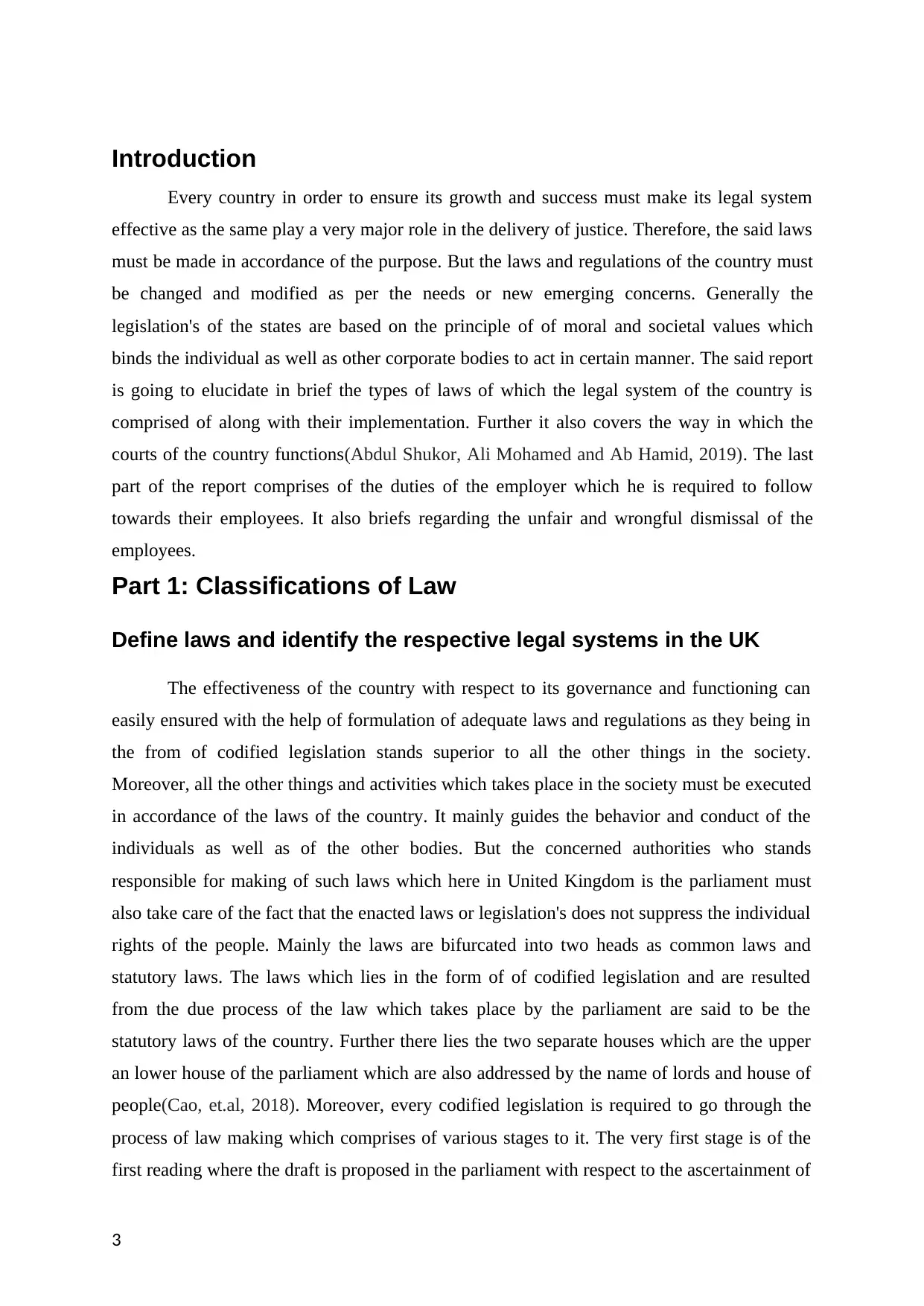
Introduction
Every country in order to ensure its growth and success must make its legal system
effective as the same play a very major role in the delivery of justice. Therefore, the said laws
must be made in accordance of the purpose. But the laws and regulations of the country must
be changed and modified as per the needs or new emerging concerns. Generally the
legislation's of the states are based on the principle of of moral and societal values which
binds the individual as well as other corporate bodies to act in certain manner. The said report
is going to elucidate in brief the types of laws of which the legal system of the country is
comprised of along with their implementation. Further it also covers the way in which the
courts of the country functions(Abdul Shukor, Ali Mohamed and Ab Hamid, 2019). The last
part of the report comprises of the duties of the employer which he is required to follow
towards their employees. It also briefs regarding the unfair and wrongful dismissal of the
employees.
Part 1: Classifications of Law
Define laws and identify the respective legal systems in the UK
The effectiveness of the country with respect to its governance and functioning can
easily ensured with the help of formulation of adequate laws and regulations as they being in
the from of codified legislation stands superior to all the other things in the society.
Moreover, all the other things and activities which takes place in the society must be executed
in accordance of the laws of the country. It mainly guides the behavior and conduct of the
individuals as well as of the other bodies. But the concerned authorities who stands
responsible for making of such laws which here in United Kingdom is the parliament must
also take care of the fact that the enacted laws or legislation's does not suppress the individual
rights of the people. Mainly the laws are bifurcated into two heads as common laws and
statutory laws. The laws which lies in the form of of codified legislation and are resulted
from the due process of the law which takes place by the parliament are said to be the
statutory laws of the country. Further there lies the two separate houses which are the upper
an lower house of the parliament which are also addressed by the name of lords and house of
people(Cao, et.al, 2018). Moreover, every codified legislation is required to go through the
process of law making which comprises of various stages to it. The very first stage is of the
first reading where the draft is proposed in the parliament with respect to the ascertainment of
3
Every country in order to ensure its growth and success must make its legal system
effective as the same play a very major role in the delivery of justice. Therefore, the said laws
must be made in accordance of the purpose. But the laws and regulations of the country must
be changed and modified as per the needs or new emerging concerns. Generally the
legislation's of the states are based on the principle of of moral and societal values which
binds the individual as well as other corporate bodies to act in certain manner. The said report
is going to elucidate in brief the types of laws of which the legal system of the country is
comprised of along with their implementation. Further it also covers the way in which the
courts of the country functions(Abdul Shukor, Ali Mohamed and Ab Hamid, 2019). The last
part of the report comprises of the duties of the employer which he is required to follow
towards their employees. It also briefs regarding the unfair and wrongful dismissal of the
employees.
Part 1: Classifications of Law
Define laws and identify the respective legal systems in the UK
The effectiveness of the country with respect to its governance and functioning can
easily ensured with the help of formulation of adequate laws and regulations as they being in
the from of codified legislation stands superior to all the other things in the society.
Moreover, all the other things and activities which takes place in the society must be executed
in accordance of the laws of the country. It mainly guides the behavior and conduct of the
individuals as well as of the other bodies. But the concerned authorities who stands
responsible for making of such laws which here in United Kingdom is the parliament must
also take care of the fact that the enacted laws or legislation's does not suppress the individual
rights of the people. Mainly the laws are bifurcated into two heads as common laws and
statutory laws. The laws which lies in the form of of codified legislation and are resulted
from the due process of the law which takes place by the parliament are said to be the
statutory laws of the country. Further there lies the two separate houses which are the upper
an lower house of the parliament which are also addressed by the name of lords and house of
people(Cao, et.al, 2018). Moreover, every codified legislation is required to go through the
process of law making which comprises of various stages to it. The very first stage is of the
first reading where the draft is proposed in the parliament with respect to the ascertainment of
3
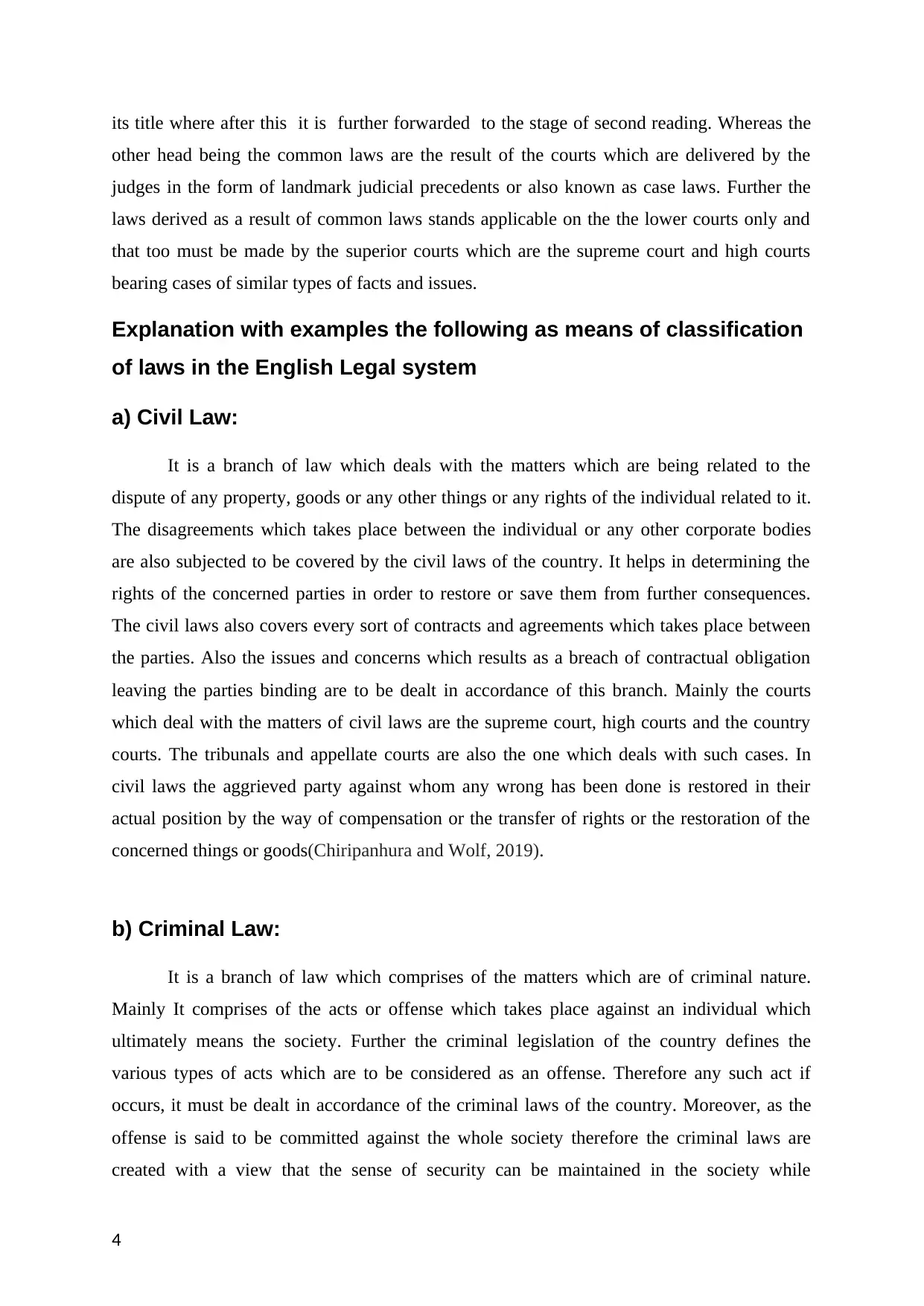
its title where after this it is further forwarded to the stage of second reading. Whereas the
other head being the common laws are the result of the courts which are delivered by the
judges in the form of landmark judicial precedents or also known as case laws. Further the
laws derived as a result of common laws stands applicable on the the lower courts only and
that too must be made by the superior courts which are the supreme court and high courts
bearing cases of similar types of facts and issues.
Explanation with examples the following as means of classification
of laws in the English Legal system
a) Civil Law:
It is a branch of law which deals with the matters which are being related to the
dispute of any property, goods or any other things or any rights of the individual related to it.
The disagreements which takes place between the individual or any other corporate bodies
are also subjected to be covered by the civil laws of the country. It helps in determining the
rights of the concerned parties in order to restore or save them from further consequences.
The civil laws also covers every sort of contracts and agreements which takes place between
the parties. Also the issues and concerns which results as a breach of contractual obligation
leaving the parties binding are to be dealt in accordance of this branch. Mainly the courts
which deal with the matters of civil laws are the supreme court, high courts and the country
courts. The tribunals and appellate courts are also the one which deals with such cases. In
civil laws the aggrieved party against whom any wrong has been done is restored in their
actual position by the way of compensation or the transfer of rights or the restoration of the
concerned things or goods(Chiripanhura and Wolf, 2019).
b) Criminal Law:
It is a branch of law which comprises of the matters which are of criminal nature.
Mainly It comprises of the acts or offense which takes place against an individual which
ultimately means the society. Further the criminal legislation of the country defines the
various types of acts which are to be considered as an offense. Therefore any such act if
occurs, it must be dealt in accordance of the criminal laws of the country. Moreover, as the
offense is said to be committed against the whole society therefore the criminal laws are
created with a view that the sense of security can be maintained in the society while
4
other head being the common laws are the result of the courts which are delivered by the
judges in the form of landmark judicial precedents or also known as case laws. Further the
laws derived as a result of common laws stands applicable on the the lower courts only and
that too must be made by the superior courts which are the supreme court and high courts
bearing cases of similar types of facts and issues.
Explanation with examples the following as means of classification
of laws in the English Legal system
a) Civil Law:
It is a branch of law which deals with the matters which are being related to the
dispute of any property, goods or any other things or any rights of the individual related to it.
The disagreements which takes place between the individual or any other corporate bodies
are also subjected to be covered by the civil laws of the country. It helps in determining the
rights of the concerned parties in order to restore or save them from further consequences.
The civil laws also covers every sort of contracts and agreements which takes place between
the parties. Also the issues and concerns which results as a breach of contractual obligation
leaving the parties binding are to be dealt in accordance of this branch. Mainly the courts
which deal with the matters of civil laws are the supreme court, high courts and the country
courts. The tribunals and appellate courts are also the one which deals with such cases. In
civil laws the aggrieved party against whom any wrong has been done is restored in their
actual position by the way of compensation or the transfer of rights or the restoration of the
concerned things or goods(Chiripanhura and Wolf, 2019).
b) Criminal Law:
It is a branch of law which comprises of the matters which are of criminal nature.
Mainly It comprises of the acts or offense which takes place against an individual which
ultimately means the society. Further the criminal legislation of the country defines the
various types of acts which are to be considered as an offense. Therefore any such act if
occurs, it must be dealt in accordance of the criminal laws of the country. Moreover, as the
offense is said to be committed against the whole society therefore the criminal laws are
created with a view that the sense of security can be maintained in the society while
4
Secure Best Marks with AI Grader
Need help grading? Try our AI Grader for instant feedback on your assignments.
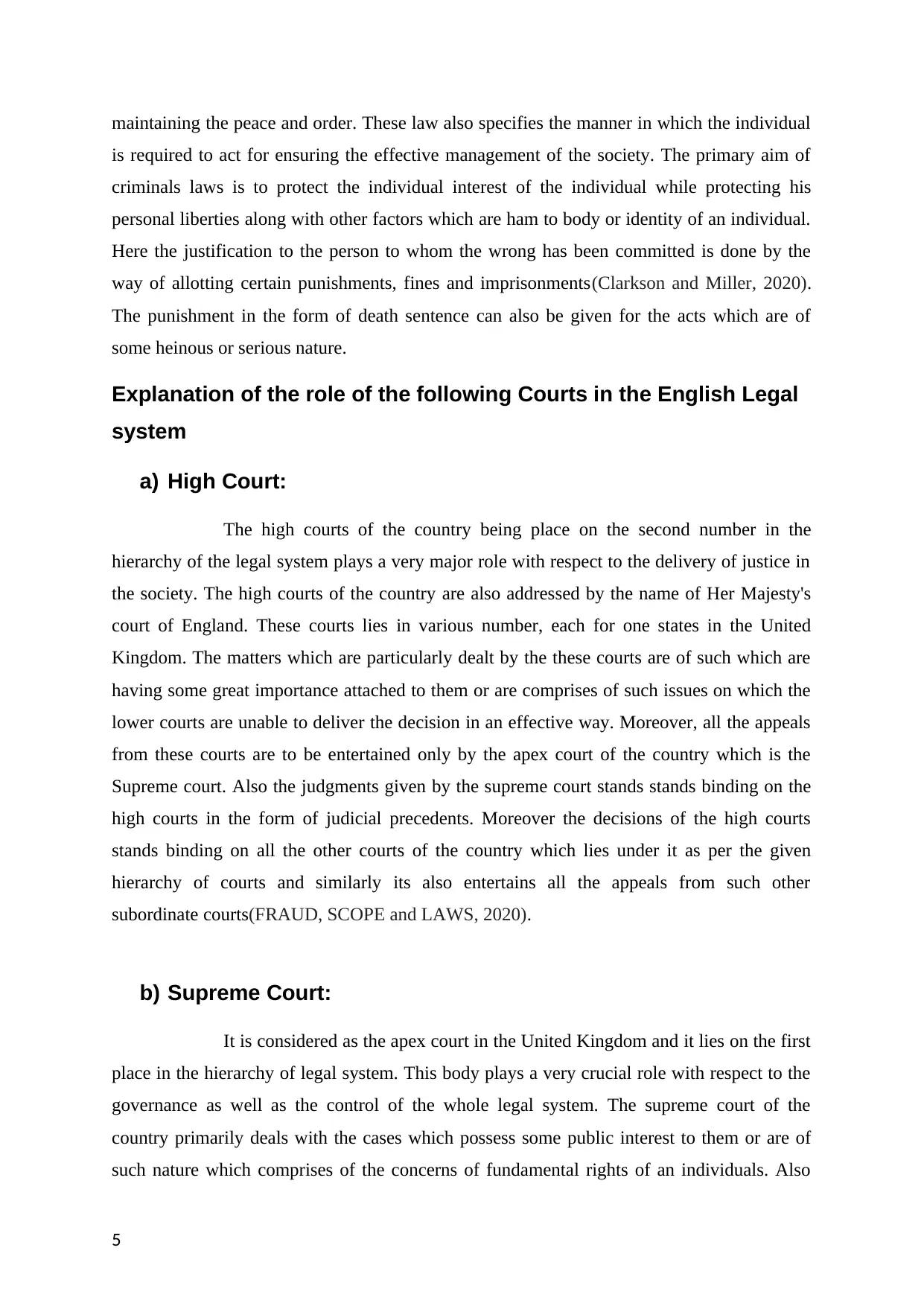
maintaining the peace and order. These law also specifies the manner in which the individual
is required to act for ensuring the effective management of the society. The primary aim of
criminals laws is to protect the individual interest of the individual while protecting his
personal liberties along with other factors which are ham to body or identity of an individual.
Here the justification to the person to whom the wrong has been committed is done by the
way of allotting certain punishments, fines and imprisonments(Clarkson and Miller, 2020).
The punishment in the form of death sentence can also be given for the acts which are of
some heinous or serious nature.
Explanation of the role of the following Courts in the English Legal
system
a) High Court:
The high courts of the country being place on the second number in the
hierarchy of the legal system plays a very major role with respect to the delivery of justice in
the society. The high courts of the country are also addressed by the name of Her Majesty's
court of England. These courts lies in various number, each for one states in the United
Kingdom. The matters which are particularly dealt by the these courts are of such which are
having some great importance attached to them or are comprises of such issues on which the
lower courts are unable to deliver the decision in an effective way. Moreover, all the appeals
from these courts are to be entertained only by the apex court of the country which is the
Supreme court. Also the judgments given by the supreme court stands stands binding on the
high courts in the form of judicial precedents. Moreover the decisions of the high courts
stands binding on all the other courts of the country which lies under it as per the given
hierarchy of courts and similarly its also entertains all the appeals from such other
subordinate courts(FRAUD, SCOPE and LAWS, 2020).
b) Supreme Court:
It is considered as the apex court in the United Kingdom and it lies on the first
place in the hierarchy of legal system. This body plays a very crucial role with respect to the
governance as well as the control of the whole legal system. The supreme court of the
country primarily deals with the cases which possess some public interest to them or are of
such nature which comprises of the concerns of fundamental rights of an individuals. Also
5
is required to act for ensuring the effective management of the society. The primary aim of
criminals laws is to protect the individual interest of the individual while protecting his
personal liberties along with other factors which are ham to body or identity of an individual.
Here the justification to the person to whom the wrong has been committed is done by the
way of allotting certain punishments, fines and imprisonments(Clarkson and Miller, 2020).
The punishment in the form of death sentence can also be given for the acts which are of
some heinous or serious nature.
Explanation of the role of the following Courts in the English Legal
system
a) High Court:
The high courts of the country being place on the second number in the
hierarchy of the legal system plays a very major role with respect to the delivery of justice in
the society. The high courts of the country are also addressed by the name of Her Majesty's
court of England. These courts lies in various number, each for one states in the United
Kingdom. The matters which are particularly dealt by the these courts are of such which are
having some great importance attached to them or are comprises of such issues on which the
lower courts are unable to deliver the decision in an effective way. Moreover, all the appeals
from these courts are to be entertained only by the apex court of the country which is the
Supreme court. Also the judgments given by the supreme court stands stands binding on the
high courts in the form of judicial precedents. Moreover the decisions of the high courts
stands binding on all the other courts of the country which lies under it as per the given
hierarchy of courts and similarly its also entertains all the appeals from such other
subordinate courts(FRAUD, SCOPE and LAWS, 2020).
b) Supreme Court:
It is considered as the apex court in the United Kingdom and it lies on the first
place in the hierarchy of legal system. This body plays a very crucial role with respect to the
governance as well as the control of the whole legal system. The supreme court of the
country primarily deals with the cases which possess some public interest to them or are of
such nature which comprises of the concerns of fundamental rights of an individuals. Also
5
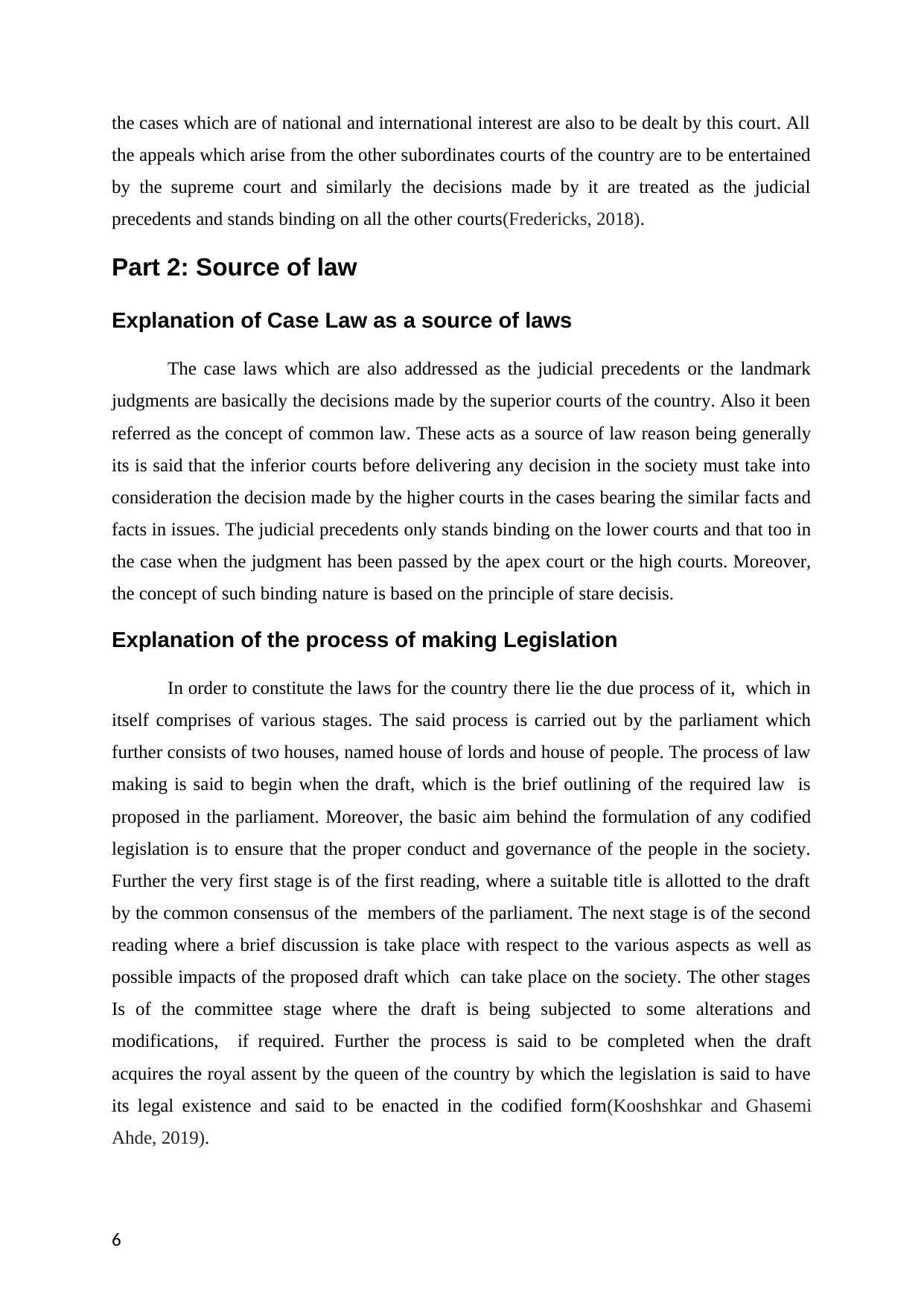
the cases which are of national and international interest are also to be dealt by this court. All
the appeals which arise from the other subordinates courts of the country are to be entertained
by the supreme court and similarly the decisions made by it are treated as the judicial
precedents and stands binding on all the other courts(Fredericks, 2018).
Part 2: Source of law
Explanation of Case Law as a source of laws
The case laws which are also addressed as the judicial precedents or the landmark
judgments are basically the decisions made by the superior courts of the country. Also it been
referred as the concept of common law. These acts as a source of law reason being generally
its is said that the inferior courts before delivering any decision in the society must take into
consideration the decision made by the higher courts in the cases bearing the similar facts and
facts in issues. The judicial precedents only stands binding on the lower courts and that too in
the case when the judgment has been passed by the apex court or the high courts. Moreover,
the concept of such binding nature is based on the principle of stare decisis.
Explanation of the process of making Legislation
In order to constitute the laws for the country there lie the due process of it, which in
itself comprises of various stages. The said process is carried out by the parliament which
further consists of two houses, named house of lords and house of people. The process of law
making is said to begin when the draft, which is the brief outlining of the required law is
proposed in the parliament. Moreover, the basic aim behind the formulation of any codified
legislation is to ensure that the proper conduct and governance of the people in the society.
Further the very first stage is of the first reading, where a suitable title is allotted to the draft
by the common consensus of the members of the parliament. The next stage is of the second
reading where a brief discussion is take place with respect to the various aspects as well as
possible impacts of the proposed draft which can take place on the society. The other stages
Is of the committee stage where the draft is being subjected to some alterations and
modifications, if required. Further the process is said to be completed when the draft
acquires the royal assent by the queen of the country by which the legislation is said to have
its legal existence and said to be enacted in the codified form(Kooshshkar and Ghasemi
Ahde, 2019).
6
the appeals which arise from the other subordinates courts of the country are to be entertained
by the supreme court and similarly the decisions made by it are treated as the judicial
precedents and stands binding on all the other courts(Fredericks, 2018).
Part 2: Source of law
Explanation of Case Law as a source of laws
The case laws which are also addressed as the judicial precedents or the landmark
judgments are basically the decisions made by the superior courts of the country. Also it been
referred as the concept of common law. These acts as a source of law reason being generally
its is said that the inferior courts before delivering any decision in the society must take into
consideration the decision made by the higher courts in the cases bearing the similar facts and
facts in issues. The judicial precedents only stands binding on the lower courts and that too in
the case when the judgment has been passed by the apex court or the high courts. Moreover,
the concept of such binding nature is based on the principle of stare decisis.
Explanation of the process of making Legislation
In order to constitute the laws for the country there lie the due process of it, which in
itself comprises of various stages. The said process is carried out by the parliament which
further consists of two houses, named house of lords and house of people. The process of law
making is said to begin when the draft, which is the brief outlining of the required law is
proposed in the parliament. Moreover, the basic aim behind the formulation of any codified
legislation is to ensure that the proper conduct and governance of the people in the society.
Further the very first stage is of the first reading, where a suitable title is allotted to the draft
by the common consensus of the members of the parliament. The next stage is of the second
reading where a brief discussion is take place with respect to the various aspects as well as
possible impacts of the proposed draft which can take place on the society. The other stages
Is of the committee stage where the draft is being subjected to some alterations and
modifications, if required. Further the process is said to be completed when the draft
acquires the royal assent by the queen of the country by which the legislation is said to have
its legal existence and said to be enacted in the codified form(Kooshshkar and Ghasemi
Ahde, 2019).
6
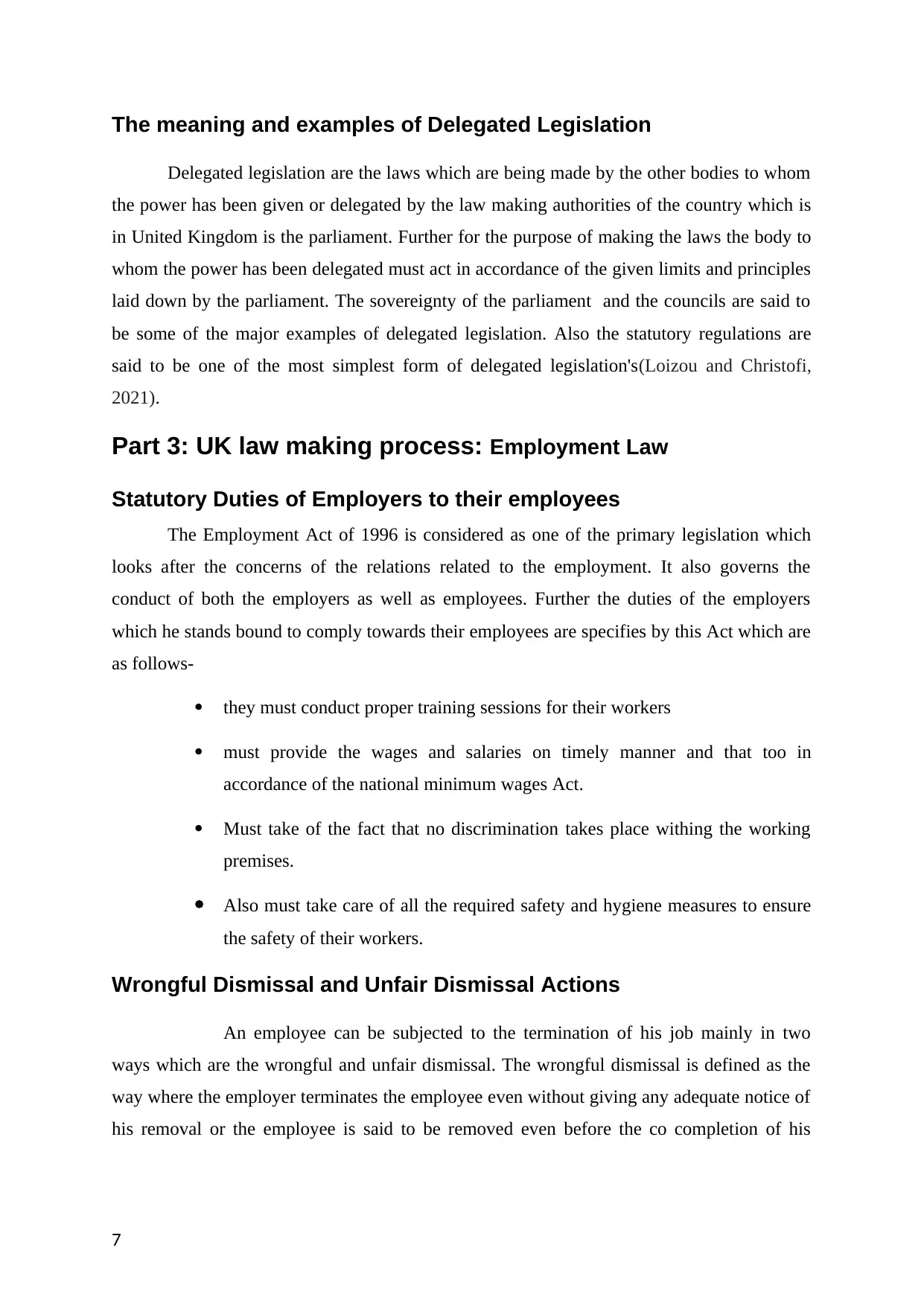
The meaning and examples of Delegated Legislation
Delegated legislation are the laws which are being made by the other bodies to whom
the power has been given or delegated by the law making authorities of the country which is
in United Kingdom is the parliament. Further for the purpose of making the laws the body to
whom the power has been delegated must act in accordance of the given limits and principles
laid down by the parliament. The sovereignty of the parliament and the councils are said to
be some of the major examples of delegated legislation. Also the statutory regulations are
said to be one of the most simplest form of delegated legislation's(Loizou and Christofi,
2021).
Part 3: UK law making process: Employment Law
Statutory Duties of Employers to their employees
The Employment Act of 1996 is considered as one of the primary legislation which
looks after the concerns of the relations related to the employment. It also governs the
conduct of both the employers as well as employees. Further the duties of the employers
which he stands bound to comply towards their employees are specifies by this Act which are
as follows-
they must conduct proper training sessions for their workers
must provide the wages and salaries on timely manner and that too in
accordance of the national minimum wages Act.
Must take of the fact that no discrimination takes place withing the working
premises.
Also must take care of all the required safety and hygiene measures to ensure
the safety of their workers.
Wrongful Dismissal and Unfair Dismissal Actions
An employee can be subjected to the termination of his job mainly in two
ways which are the wrongful and unfair dismissal. The wrongful dismissal is defined as the
way where the employer terminates the employee even without giving any adequate notice of
his removal or the employee is said to be removed even before the co completion of his
7
Delegated legislation are the laws which are being made by the other bodies to whom
the power has been given or delegated by the law making authorities of the country which is
in United Kingdom is the parliament. Further for the purpose of making the laws the body to
whom the power has been delegated must act in accordance of the given limits and principles
laid down by the parliament. The sovereignty of the parliament and the councils are said to
be some of the major examples of delegated legislation. Also the statutory regulations are
said to be one of the most simplest form of delegated legislation's(Loizou and Christofi,
2021).
Part 3: UK law making process: Employment Law
Statutory Duties of Employers to their employees
The Employment Act of 1996 is considered as one of the primary legislation which
looks after the concerns of the relations related to the employment. It also governs the
conduct of both the employers as well as employees. Further the duties of the employers
which he stands bound to comply towards their employees are specifies by this Act which are
as follows-
they must conduct proper training sessions for their workers
must provide the wages and salaries on timely manner and that too in
accordance of the national minimum wages Act.
Must take of the fact that no discrimination takes place withing the working
premises.
Also must take care of all the required safety and hygiene measures to ensure
the safety of their workers.
Wrongful Dismissal and Unfair Dismissal Actions
An employee can be subjected to the termination of his job mainly in two
ways which are the wrongful and unfair dismissal. The wrongful dismissal is defined as the
way where the employer terminates the employee even without giving any adequate notice of
his removal or the employee is said to be removed even before the co completion of his
7
Paraphrase This Document
Need a fresh take? Get an instant paraphrase of this document with our AI Paraphraser
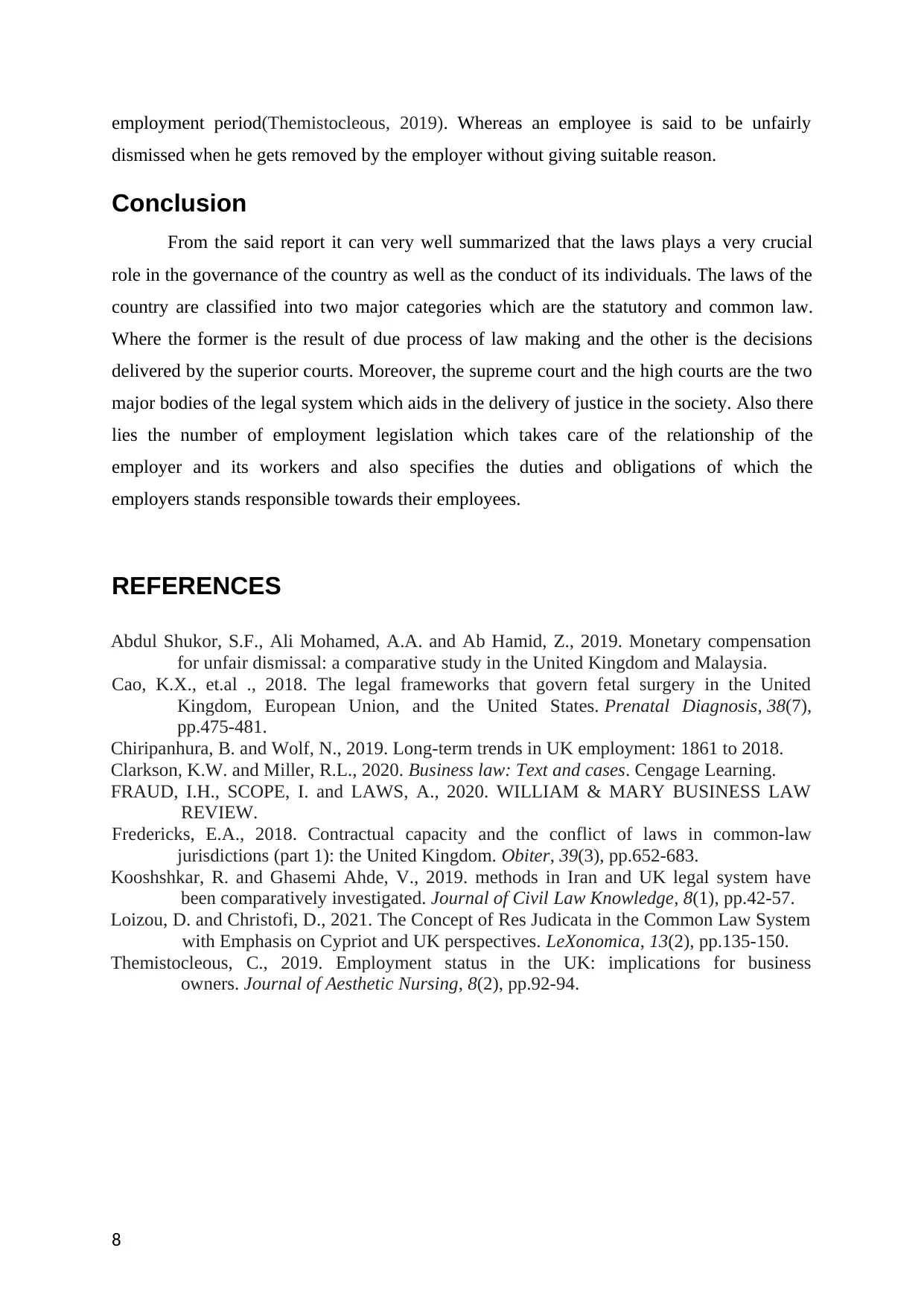
employment period(Themistocleous, 2019). Whereas an employee is said to be unfairly
dismissed when he gets removed by the employer without giving suitable reason.
Conclusion
From the said report it can very well summarized that the laws plays a very crucial
role in the governance of the country as well as the conduct of its individuals. The laws of the
country are classified into two major categories which are the statutory and common law.
Where the former is the result of due process of law making and the other is the decisions
delivered by the superior courts. Moreover, the supreme court and the high courts are the two
major bodies of the legal system which aids in the delivery of justice in the society. Also there
lies the number of employment legislation which takes care of the relationship of the
employer and its workers and also specifies the duties and obligations of which the
employers stands responsible towards their employees.
REFERENCES
Abdul Shukor, S.F., Ali Mohamed, A.A. and Ab Hamid, Z., 2019. Monetary compensation
for unfair dismissal: a comparative study in the United Kingdom and Malaysia.
Cao, K.X., et.al ., 2018. The legal frameworks that govern fetal surgery in the United
Kingdom, European Union, and the United States. Prenatal Diagnosis, 38(7),
pp.475-481.
Chiripanhura, B. and Wolf, N., 2019. Long-term trends in UK employment: 1861 to 2018.
Clarkson, K.W. and Miller, R.L., 2020. Business law: Text and cases. Cengage Learning.
FRAUD, I.H., SCOPE, I. and LAWS, A., 2020. WILLIAM & MARY BUSINESS LAW
REVIEW.
Fredericks, E.A., 2018. Contractual capacity and the conflict of laws in common-law
jurisdictions (part 1): the United Kingdom. Obiter, 39(3), pp.652-683.
Kooshshkar, R. and Ghasemi Ahde, V., 2019. methods in Iran and UK legal system have
been comparatively investigated. Journal of Civil Law Knowledge, 8(1), pp.42-57.
Loizou, D. and Christofi, D., 2021. The Concept of Res Judicata in the Common Law System
with Emphasis on Cypriot and UK perspectives. LeXonomica, 13(2), pp.135-150.
Themistocleous, C., 2019. Employment status in the UK: implications for business
owners. Journal of Aesthetic Nursing, 8(2), pp.92-94.
8
dismissed when he gets removed by the employer without giving suitable reason.
Conclusion
From the said report it can very well summarized that the laws plays a very crucial
role in the governance of the country as well as the conduct of its individuals. The laws of the
country are classified into two major categories which are the statutory and common law.
Where the former is the result of due process of law making and the other is the decisions
delivered by the superior courts. Moreover, the supreme court and the high courts are the two
major bodies of the legal system which aids in the delivery of justice in the society. Also there
lies the number of employment legislation which takes care of the relationship of the
employer and its workers and also specifies the duties and obligations of which the
employers stands responsible towards their employees.
REFERENCES
Abdul Shukor, S.F., Ali Mohamed, A.A. and Ab Hamid, Z., 2019. Monetary compensation
for unfair dismissal: a comparative study in the United Kingdom and Malaysia.
Cao, K.X., et.al ., 2018. The legal frameworks that govern fetal surgery in the United
Kingdom, European Union, and the United States. Prenatal Diagnosis, 38(7),
pp.475-481.
Chiripanhura, B. and Wolf, N., 2019. Long-term trends in UK employment: 1861 to 2018.
Clarkson, K.W. and Miller, R.L., 2020. Business law: Text and cases. Cengage Learning.
FRAUD, I.H., SCOPE, I. and LAWS, A., 2020. WILLIAM & MARY BUSINESS LAW
REVIEW.
Fredericks, E.A., 2018. Contractual capacity and the conflict of laws in common-law
jurisdictions (part 1): the United Kingdom. Obiter, 39(3), pp.652-683.
Kooshshkar, R. and Ghasemi Ahde, V., 2019. methods in Iran and UK legal system have
been comparatively investigated. Journal of Civil Law Knowledge, 8(1), pp.42-57.
Loizou, D. and Christofi, D., 2021. The Concept of Res Judicata in the Common Law System
with Emphasis on Cypriot and UK perspectives. LeXonomica, 13(2), pp.135-150.
Themistocleous, C., 2019. Employment status in the UK: implications for business
owners. Journal of Aesthetic Nursing, 8(2), pp.92-94.
8
1 out of 8
Related Documents
Your All-in-One AI-Powered Toolkit for Academic Success.
+13062052269
info@desklib.com
Available 24*7 on WhatsApp / Email
![[object Object]](/_next/static/media/star-bottom.7253800d.svg)
Unlock your academic potential
© 2024 | Zucol Services PVT LTD | All rights reserved.